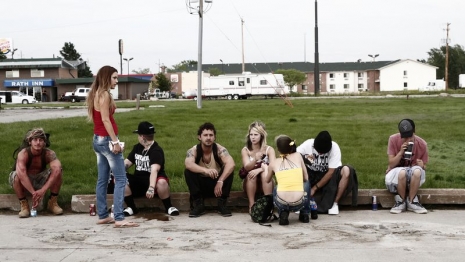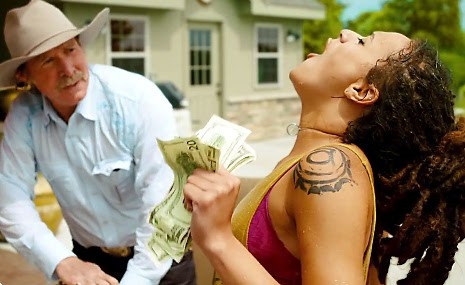
I think many us have been there: broke and looking for any kind of gig that will get us enough money to make it from one day to another. I did phone sales of subscriptions to a right wing Orange County newspaper. I was 16 and living on the streets of L.A. and needed money… badly. I worked with a dozen or so runaway kids sitting in a miserable loft dialing numbers all day and spewing made up stories of how the subscription revenue was going to help our high school build a new gym (I was a high school dropout) or help Vietnam vets get back on their feet (if they still had any). I lied all day, every day. And for all my bullshitting, I rarely walked with any money. The lying was easy. I read from a script. When I got really bored, I’d improvise. Back then people were polite on the phone. A lot of them bought into my rap. I couldn’t stand myself. I didn’t last a week. Selling beat drugs on Sunset to weekend hippies seemed like a slightly better karmic option.
Andrea Arnold’s powerful, poetic and liberating new movie American Honey deals with “mag crews,” young people going door to door in mostly affluent neighborhoods selling magazine subscriptions, using lies and artful scams to make a few bucks. For every subscription sold, the magazine clearing houses and publishers get a percentage and the rest is split between crew leaders and the kids doing the selling. Whatever hook it takes to sell a subscription—school projects, charities, scholarships, etc.—is used to separate a customer from their money. Selling magazine subscriptions in the digital age is hardly a ticket to the big time. But desperate times require desperate measures… even when they’re stupid.

Director Arnold (Fish Tank, Red Road) first discovered the mag crew world when she read Ian Urbina’s article on the subject in the New York Times. She decided to make a movie based on the article. She flew from England to America, rented a car, and drove alone along 1000s of miles of America’s highways. She saw all of the things that make America beautiful, wretched, intimidating and heartbreaking. She encountered hopelessness in a lot of small towns that have gone to hell because of poverty and drugs—the kind of drugs that become intertwined with a sense of there being no future.
American Honey follows a mag crew as they make the kind of trip that Arnold made. A small family of lost souls traveling across America getting stoned, singing along to rap, rock and country songs, living in the moment while the quiet dread of the unknown permeates the air like invisible thunderclouds. At times exhilarating, often tense and foreboding, American Honey subverts most of the viewer’s expectations at every turn. The film seems bleak on the surface but rays of light are constantly breaking through the darkness. Underneath the hardened exterior of these kids are layers of softness, sweetness and pain. Cuddling and sleeping together in sleazy motel rooms they appear as they are: children.
Blue Diamond Sales is typical of the kind of companies that use mag crews to generate revenue. Their website paints a rosy picture of the road to success:
Blue diamond subscriptions sells door to door subscriptions to magazines and books. Blue diamond travels the entire country helping young adults who wish to earn experience in the sales industry.
But their YouTube channel gets closer to reality:
The mag crews are tight knit bands with an almost cult-like devotion to their crew leaders—very much like a hooker’s relationship to their pimp. They travel in small groups in battered vans, crisscrossing America desperate to grab hold of the lowest rung of the American dream. From hustling truckers at truck stops to millionaire good ol’ boy ranchers and lonely, extremely horny guys working the oil fields of Oklahoma, the girls in American Honey go to where the money and easy marks are. These scenes are filled with tension, effectively tapping into the audience’s horror flick presumptions. But this is not a slasher film. The knives are psychological and go deeper beyond bone and flesh into the seat of the soul. A scene where a little girl in an Iron Maiden t-shirt sings The Dead Kennedys’ “I Kill Children” while her crackhead mother lies comatose in the background makes the torture porn of “Human Centipede” seem like “Happy Days” with hemorrhoidal itch. Reality has now entered a zone that even horror movies struggle to find resonant metaphors.
The mag crews aren’t much different than many of the kids who ended up in The Haight in 1968, the year after the Summer Of Love. They weren’t looking for an Aquarian age, they were looking to get out of bad situations back home. Many had suffered abuses of every nature. They came to the Haight to hook up with kindred spirits and forge communities. They weren’t hippies but they were open to anything that might give them a sense of better days. A sense of love. Ten years later on New York’s Lower East Side there was a similar influx of suburban kids looking to get away from the soul-deadening schools, shopping malls, and apathy that gutted whatever feelings of freedom they felt entitled to. The crews are a slightly better dressed version of the crusty punks I see camping in the woods behind my store in Austin.
Unlike the hippies or punks, the mag crews haven’t turned their backs on capitalism or the American Dream. The kids in American Honey see Wal-Mart as an oasis in the tattered streets of Crack Town. They want money. And they want it now. Bling is their thing and the rap songs on the movies soundtrack set the tone. These kids are white but their frame of reference is Black. Together they create a sense of mattering. They matter to each other.
Comparisons will be made to the films of Larry Clark and Harmony Korine, but American Honey is more lyrical and less cynical than Kids or Spring Breakers. Clark’s Ken Park has moments of the kind of tenderness and bittersweetness of Arnold’s film. Both movies celebrate humanity over complete despair. And in each film, sex is threatening as well as liberating. Arnold’s point of view is that of a woman who knows from day to day experience that men are unpredictable animals and American Honey is suffused with an atmosphere of sexual peril without being gratuitous or exploitative.

American Honey is three hours long and it rambles and careens like the crews bouncing from state to state in their Econoline van. The length of the film never seems overlong. Its length actually gives the viewer the sense of being along for the ride. There are no big dramatic moments – except for the ones in the audience’s heads. The movie constantly subverts expectations. The drama comes in the small observations and the occasional emotional explosions. All of it moving along to a soundtrack composed of 24 wildly eclectic songs ranging from Kevin Gates to The Raveonettes, Springsteen, Steve Earle, E-40 and Mazzy Star. It all works sublimely and for every moment of suffocating emptiness there’s an epiphany fueled by music, a bottle of cheap whiskey and lots of pot.
American Honey won awards at this year’s Cannes Film Festival including best actress for Sasha Lane. This is her film debut. Shia LaBeouf is perfectly cast as a cocky hustler. Sporting a Confederate flag bikini, Riley Keough (Elvis Presley’s granddaughter) is the cold-hearted crew leader and she’s amazing. The entire cast of non-professional actors ARE the real thing. Robbie Ryan’s cinematography is glorious, capturing the American landscape in a fugue-like state between night, day and what lays in between.
American Honey is opening this Friday in a few major cities and then nationwide on October 7. It’s an important movie. One that gets almost everything right about what’s bad and what’s good about America in the era of Trump. Being bombarded by dark prophecies from a sociopath running for President plays into the deeply pessimistic view young people already have of their future. American Honey hints at a way out: love





